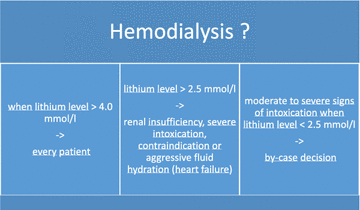
Over time, these factors can cause lithium to slowly build up in your body. Dehydration, other medications, and other conditions including kidney problems, can affect how your body handles lithium. This happens when you take a little too much lithium daily over a long period of time. This happens when you take too much lithium at once, either accidentally or on purpose.

There are three main types of lithium toxicity, each with different causes: Lithium toxicity is usually caused by taking more than your prescribed dose of lithium, either at once or slowly over a long period of time. However, they may be a sign that you need to adjust your dosage or need more frequent monitoring. These side effects can happen with low doses of lithium and don’t mean you have lithium toxicity. Tell your doctor if you take lithium and notice any of the following side effects: Keep in mind that lithium can also cause side effects when taken in lower doses. Serum levels of lithium above 2.0 mEq/L can cause severe toxicity and additional symptoms, including: Symptoms of mild to moderate lithium toxicity include:

The symptoms of lithium toxicity and their severity depend on how much lithium is in your blood. What are the symptoms of lithium toxicity? In 2014, for example, there were 6,850 reported cases of lithium toxicity in the United States. It’s easy to accidentally overdose on lithium by taking an extra pill, mixing it with other medications, or not drinking enough water. People taking lithium need to carefully monitor how much they take it and when. Levels of 3.0 mEq/L and higher are considered a medical emergency. Severe lithium toxicity happens at a level of 2.0 mEq/L and above, which can be life-threatening in rare cases. Lithium toxicity can happen when this level reaches 1.5 mEq/L or higher. Others may be more sensitive to lower doses.Ī safe blood level of lithium is 0.6 and 1.2 milliequivalents per liter (mEq/L).


Some people take more than 1,200 mg per day, especially during acute episodes. The right dosage of lithium varies from person to person, but most people are prescribed between 900 mg to 1,200 mg per day, in divided doses. Lithium helps reduce episodes of mania and lowers the risk of suicide in people with these conditions. It occurs when you take too much lithium, a mood-stabilizing medication used to treat bipolar disorder and major depressive disorder. Lithium toxicity is another term for a lithium overdose. That said, exceeding these doses can result in lithium toxicity or overdose. Higher doses may be needed in some cases. The optimal dose of lithium can vary widely but typically ranges from 900 milligrams (mg) to 1,200 mg per day.


 0 kommentar(er)
0 kommentar(er)
